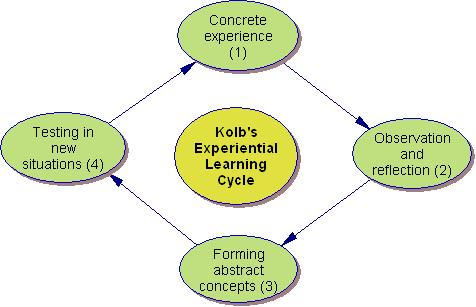Experiential Learning
Definition
According to Kolb, this type of learning can be defined as “the process whereby knowledge is created through the transformation of experience.
The word experiential essentially means that learning and development are achieved through personally determined experience and involvement, typically in group, by observation, listening, study of theory or hypothesis, or some other transfer of skills or knowledge.

Figure 1. Kolbs Experiential Learning Cycle. Source: http://3.bp.blogspot.com/-VKyoStQL_a4/T-HMJX1i57I/AAAAAAAACik/Dsmg2NBDxgw/s1600/experiential-learning-cycle-kolb.gif
Basic Assumptions and Principles
The theory was proposed by psychologist David Kolb who was influenced by the work of other theorists includingJohn Dewey, Kurt Lewin, and Jean Piaget.
- Learning involves concrete experience and reflection
- Learning requires the resolution of conflicts between dialectically opposed modes of adaptation to the world, i.e. reflection and action – and feeling and thinking.
- Learning is a holistic process of adaptation to the world, not just cognition but also feeling, perceiving, and behaving.
- Learning results from synergetic transactions between the person and the environment.
- Learning is the process of creating knowledge.
A four-stage cyclical theory of learning, Kolbs experiential learning theory is a holistic perspective that combines experience, perception, cognition, and behavior.
Kolbs four-stage learning cycle shows how experience is translated through reflection into concepts, which in turn are used as guides for active experimentation and the choice of new experiences.
- Concrete experience (CE): the learner actively experiences an activity such as a lab session or field work.
- Reflective observation (RO): the learner consciously reflects back on that experience.
- Abstract conceptualization (AC): the learner attempts to conceptualize a theory or model of what is observed.
- Active experimentation (AE): the learner is trying to plan how to test a model or theory or plan for a forthcoming experience.
Completing this cycle leads to new experience, setting of a new cycle. The time frame for a cycle varies with the learner and scope of the learning experience. It should be noted that a learning cycle can begin at any point within the cycle. The cycle also spirals with each cycle building upon the previous one.
Kolb identified four learning styles which correspond to these stages, and highlight conditions under which learners learn better:
- Assimilators, who learn better when presented with sound logical theories to consider
- Convergers, who learn better when provided with practical applications of concepts and theories
- Accommodators, who learn better when provided with hands-on experiences
- Divergers, who learn better when allowed to observe and collect a wide range of information
Classroom Implication and Teaching Strategies
- Find/create experiential learning opportunities
- Learners are important
- Reactions to experiences vary so don’t pre-judge
- Single events can enable several different learning effects
- Build confidence before addressing attitudes and behaviour
- The activity must be real and engaging – not based on artificial impact
- Ensure activities allow adequate and meaningful reviews
- Carefully reviews of activities are crucial
- Accentuate the positives
- Use stimulating questions in reviews, especially for groups discussions
- Have faith in people’s ability to learn for themselves
- It’s about them not you
© Experiential Learning Activities – Concept and Principles, Martin Thompson and MTA, 2008.
Experiential learning originated from Kolb as key theorist and roots go back to Dewey; but this version developed in the 1960s focus on experience and reflection of individual learning. With changes in learning moving towards social and cognitive views, experiential learning has developed and it can be seen with resemblance with constructivist and social-cultural theories (see later section).
Resources
Key Works
- Dewey, J. (2007). Experience and education. Simon and Schuster.
- Dewey, J. (2004). Democracy and education. Courier Dover Publications.
- Kolb, D. A. (1984). Experiential learning: Experience as the source of learning and development (Vol. 1). Englewood Cliffs, NJ: Prentice-Hall.
- Kolb, D. A., & Fry, R. E. (1974). Toward an applied theory of experiential learning. MIT Alfred P. Sloan School of Management.